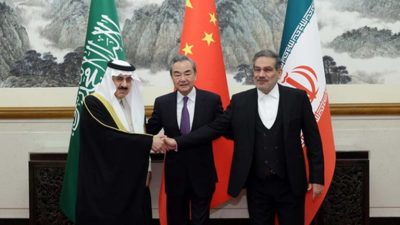China’s Middle East Ambitions Being Tested by Israel-Gaza War

All Global Research articles can be read in 51 languages by activating the Translate Website button below the author’s name.
To receive Global Research’s Daily Newsletter (selected articles), click here.
Click the share button above to email/forward this article to your friends and colleagues. Follow us on Instagram and Twitter and subscribe to our Telegram Channel. Feel free to repost and share widely Global Research articles.
***
The reason for China’s declared “neutral position” in the war between Israel and Gaza is that US influence in the region may increase, writes the Financial Times newspaper, with reference to diplomats and analysts. However, this so-called neutral position is not having the desired effect as Israel is becoming outraged in what they perceive as “pro-Palestine neutrality.”
According to the publication, the escalation of the conflict in the Middle East could become a major test for China, which seeks to strengthen its influence in the region that is “traditionally dominated by the US.” The US continues to be the strongest military power in the Middle East, and in the current crisis, it has already “demonstrated its might” by sending two groups of aircraft carriers, the USS Eisenhower and the USS Gerald R Ford, to the Eastern Mediterranean, the newspaper continues.
Furthermore, Washington remains the “main diplomatic player in the region, despite Arab concerns that it has been disengaging” and is Israel’s biggest ally.
At the same time, China, whose economic role in the region has grown rapidly in recent decades, is on good terms with almost all players, especially Iran, the main backer of Hamas and Lebanon’s Hezbollah. It is recalled that under the draft of the 25-year agreement signed in 2020, China will invest $400 billion in Iran’s economy in exchange for discounted oil.
The publication recalls that in recent years, Beijing played an important role in attracting four Middle Eastern countries – Egypt, Iran, Saudi Arabia, and the United Arab Emirates – to the BRICS group and contributed to the successful mediation of relations between Saudi Arabia and Iran, something which outraged Washington.
Analysts also note that after the start of the war between Israel and Gaza, China “struck a neutral tone that angered many Israelis and western countries,” calling on both sides to “remain calm” and not condemning the actions of the Palestinian faction.
“It’s true that China can negotiate something between Saudi Arabia and Iran, but that’s not creating any great confidence on the Israeli side,” said a diplomat cited by the Financial Times. Therefore, according to the diplomat, if China does not choose a side soon, it cannot arbitrate or mediate the conflict.
Chinese foreign minister Wang Yi told his Iranian counterpart Amir-Abdollahian during their meeting on October 15 in Beijing that
“the root cause… of the Palestine-Israel situation is that the Palestinian people’s right to statehood has been set aside for a long time.”
“This historical injustice should end as soon as possible,” Wang said, adding that “China will continue to stand on the side of peace and support the just cause of the Palestinian people in safeguarding their national rights.”
On the same day as his meeting with Amir-Abdollahian, Wang said in a call with Saudi Arabia’s Prince Faisal bin Farhan that Israel’s actions were now “beyond the scope of self-defence” and the Israeli government must “cease its collective punishment of the people of Gaza.”
“(Israel) should listen earnestly to the calls of the international community and the UN secretary general, and cease its collective punishment of the people of Gaza,” Wang added.
By describing the Israel-Palestine conflict as a “historical injustice” for the Palestinians, Beijing is now accused of having “pro-Palestine neutrality.” It was also noted that China’s official statements on the conflict have not specifically named Hamas in their condemnations of violence, leading to criticism in Israel.
Nonetheless, China’s special envoy on Middle Eastern issues, Zhai Jun, will visit the Middle East next week to push for a ceasefire in the Israel-Gaza conflict and promote peace talks. Zhai also called Israeli officials last week to reaffirm that China “has no selfish interests on the Palestinian issue but has always stood on the side of peace, on the side of fairness and justice” and that “China is willing to work with the international community to promote peace and encourage talks.”
Although his rhetoric was one of a neutral third party who could mediate on the issue, Wang’s statements consolidated Israel’s suspicions that China is not neutral.
Beijing will attempt to play an enhanced role in efforts to end the war to secure its economic interests and capitalise on the Arab states’ frustration with the US. It remains to be seen if they can achieve the same level of success as they did in reconciling Saudi Arabia and Iran to establish itself as a great power in the region because this is essentially decided on whether Israel views China as a trusted mediator, which at this point in time appears doubtful.
*
Note to readers: Please click the share button above. Follow us on Instagram and Twitter and subscribe to our Telegram Channel. Feel free to repost and share widely Global Research articles.
Ahmed Adel is a Cairo-based geopolitics and political economy researcher. He is a regular contributor to Global Research.
Featured image is from Silent Crow News

